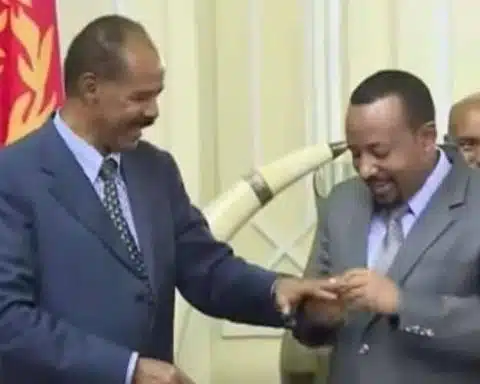By Mesfin Mekonen, Chairman Ethiopian-American civic organizations

Africa’s second most populous country stands on the brink of collapse. Without swift U.S. action, Ethiopia risks becoming a haven for terrorists, destabilizing the Horn of Africa, and descending into a humanitarian catastrophe. It isn’t too late to prevent this fate, but time is running out.
At a time when Washington is focused on prioritizing its national interests, allowing Ethiopia to collapse would be a strategic failure. If the U.S. cedes influence in the Horn of Africa, China and Russia will fill the void. Preventing Ethiopia’s descent into chaos isn’t just a moral obligation—it is a crucial national security concern for the United States.
Despite the severity of Ethiopia’s crisis, it has not received the attention it warrants. Few Americans recognize Ethiopia’s critical role in regional security. Its stability is essential for controlling extremism in East Africa, ensuring Red Sea trade routes remain open, and countering Chinese and Russian influence in the region.
Ethiopia’s leader, Abiy Ahmed, was awarded the Nobel Peace Prize in 2019, about 18 months after taking office with promises of peace, democracy, and economic prosperity. However, the prize proved to be a cruel illusion, emboldening Abiy with a sense of impunity. In November 2020, he plunged Ethiopia into a devastating war against the Tigray minority, resulting in the deaths of approximately half a million people, mostly civilians.
Today, Abiy’s government is waging a new war—this time against the Amhara people. Government forces have attacked unarmed civilians with drones and have committed massacres, mass rape, and widespread displacement. Across the country, the Ethiopian government has arrested and tortured opposition politicians, suppressed peaceful political demonstrations, and attacked journalists.
Erasing centuries of coexistence, Abiy’s government has perpetuated ethnic division, continuing policies instituted by Ethiopia’s dictatorship in 1991 that pit ethnic groups against one another. Constitutional reform is key to Ethiopia’s future. Artificial ethnic distinctions that fuel conflict must be eliminated, basic human rights protected, and systemic corruption eradicated.
Government corruption has only worsened Ethiopia’s suffering. In June 2023, USAID and the World Food Program suspended aid after uncovering the largest food aid theft in history—a massive scam involving government officials. The suspension lasted months, deepening hunger across the country. Aid resumed in November 2023, with new safeguards like GPS tracking to prevent theft.
Abiy’s policies have displaced approximately four million people and failed to deliver the promised prosperity that Ethiopians deserve. The UN Office for the Coordination of Humanitarian Affairs recently estimated that over 20 million Ethiopians need food aid, with only about a third receiving it. This crisis worsened after the Trump administration froze most USAID assistance. While a waiver for emergency assistance has allowed some aid to resume, many humanitarian programs have been halted or disrupted. Further funding disruptions for NGOs providing essential services could exacerbate the crisis.
Ethiopia’s fate ultimately lies in the hands of its people, but the U.S. can and should help.




